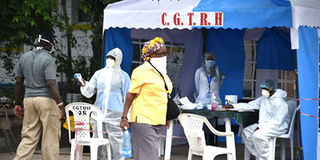Planning for the Covid-19 response

Mombasa residents are screened at Coast General Hospital as government intensifies efforts to curb the spread of coronavirus, on April 3, 2020. PHOTO | KEVIN ODIT | NATION MEDIA GROUP
What you need to know:
- We have now reached a stage where we are practically negotiating with all that would listen to lessen the Covid-19 in exchange for better decision-making in future.
- We will have to be ready to keep adapting our strategy to the shifts in the shape and depth of this pandemic.
We are entering the fourth week since the first case of Covid-19 was confirmed in this country.
Perspectives are shifting rapidly as we ramp up our capacity to test and confirm more and more people with this infection, and one hopes that more rational and long term thinking is being allowed some space in the midst of this storm.
Today we need to agree that the time for shouting at each other has come and gone, and the time to come together to map out sustainable strategies for controlling this and future pandemics is here.
In the late sixties, Elisabeth Kubler-Ross described what she considered the five stages of dying - denial, anger, bargaining, depression, and acceptance.
She argued that anyone facing certain death would naturally go through these stages before coming to a point of acceptance.
This rubric has since been found to be very useful in understanding grieving in general, for any kind of actual or imminent loss.
In the context of Covid-19, practically all countries in the world have gone through a very public process of grieving roughly following these same stages.
ACCEPTANCE
In Kenya, we began by dismissing the threat of this pandemic as firstly, a Chinese bug, then a ‘mzungu’ problem, and finally, a climatic issue.
In all these scenarios, we mentally placed ourselves in the safe zone, with Covid-19 only being capable of affecting the ‘others’.
As each of these ideas were debunked by the relentless spread of this infection, there were indeed angry reactions, with people being reluctant to change their initial assumptions but being daily assailed by contrary statistics.
We have now reached a stage where we are practically negotiating with all that would listen to lessen the Covid-19 in exchange for better decision-making in future.
The inexorable rise in the numbers of those affected will continue to temper our expectations, and one hopes we will quickly navigate the depressing stage as quickly as possible so that we come to the acceptance that the pandemic is here with us, and might be here for a long time.
This acceptance will help us to put all our plans in context. Given that we already have many people who are infected in the country, and they in turn have had contact with many others, we will have to accept the spectre of continued community spread, and our strategy of testing and contact tracing accompanied by isolation of those that are affected will have to continue for a while.
POSSIBLE SCENARIOS
Additionally, we will have to be ready to keep adapting our strategy to the shifts in the shape and depth of this pandemic.
For instance, we may have to start thinking of a scenario where an overwhelming majority of people living in a certain locality are infected, and consider alternatives such as isolating the locality and allowing those with mild to moderate symptoms to recuperate at home while receiving tele-support from the intervention team.
Once we reach a point when a large proportion of the population has been exposed to the virus, we may have to consider abandoning mass testing and shifting focus to helping those with more severe disease in hospital.
In preparation for these scenarios, we must continue to make significant investments in our health system, to make it resilient and adaptive so that the care for Kenyans with other ailments is not catastrophically affected.
Lukoye Atwoli is Associate Professor of Psychiatry, Moi University School of Medicine; [email protected]





